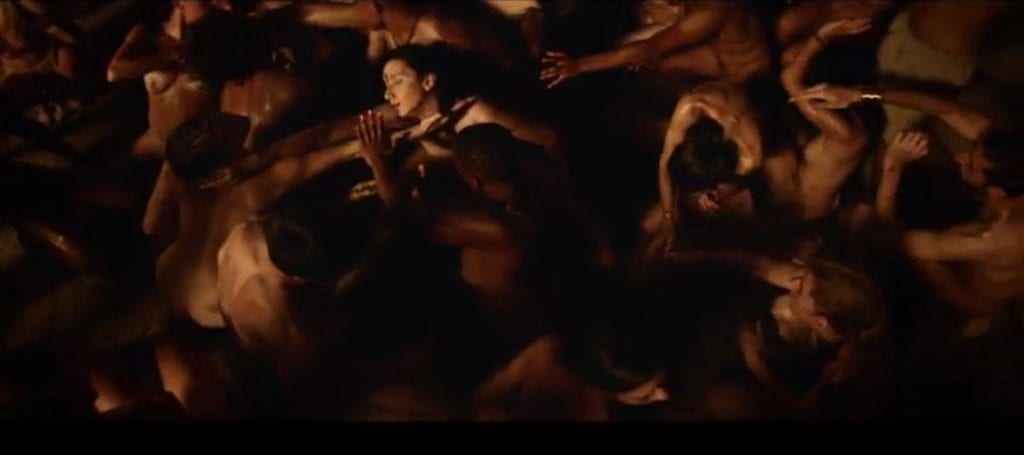Bilquis was probably the second most prominent female character on American Gods, after Laura. That still means we saw little enough of her. She got some attention at the very beginning of the show, and then in the last episode. That in itself is not very satisfying, but that’s nothing compared to what her story actually looked like. I am aware it is largely taken from the source material, so this is criticism of Gaiman as well. But as I said in another article, there’s a difference between writing this kind of thing twenty years ago and writing it now. Especially when the show made so many changes to the book, surely this could have been changed as well?
But I’m getting ahead of myself. First, to explain my upset, a little intro on this marvelous character…
Bilquis in Legends and Holy Books
The first mention of Bilquis—under the title of the Queen of Sheba—is in the Hebrew Bible, in the Book of Kings. There, she comes to test Solomon with some riddles. She is super impressed with his wisdom and riches and tells him so, and in return, he gives her “her heart’s desire.” Because people were just the same a several centuries ago as they are now, that immediately gave rise to tons of fanfiction.
Not all of it directly says she had sex with Solomon, but some of it sure does. More importantly, though, the Jewish apocryphal accounts of her bring the theme of gender in rather pointedly. Bilquis is said to have hairy legs (or, in one version, vagina) and is berated for that by Solomon, who claims that’s unfit for a woman. Sometimes he even shaves her. In the version that’s most sympathetic to the Queen, she just ignores this remark, because really, Solomon? After you seemed so wise, too.

The Quranic account of the story hints at the legs episode as well, but with no sign of gender issues being at stake. Solomon certainly doesn’t talk about her bodily hair! The later Muslim sources make up for that, however, and include the episode. It’s also these versiont that give the Queen the name Bilquis. In their stories, however, the whole issue of her legs is tied to her possibly being a half-jinn and having legs like a goat. It’s a relief to find out she doesn’t, but the body hair still puts Solomon off, and shaving is arranged so that there can be a wedding. Yes, we’re in the realm of explicit romance once again. Explicit in the sense of fully articulated. There is no porn in the Tales of the Prophets, let me reassure you.
What’s more important about these versions of the story, however, is the whole origin of Bilquis they include. Her mother was a jinn, and her father was king. She was supposed to rule after him, but you know how it is with women in power. People had issues with a woman ruling over them, and part of them chose a guy for their king instead. Only to regret their choice when he started to serially rape his female subjects. Hearing about this, Bilquis declared she would marry the guy—she calls him “boy”, actually—and then she gets him drunk and kills him on their wedding night. Afterwards, she becomes the queen in her own right. There is not a single thing not to love about this story.
Then there is the Ethiopian version of her tale. In that, the queen is called Makeda, and she rules Ethiopia. She goes to see Solomon for his wisdom, and after long intellectual conversations, he convinces her to convert to Judaism. Then he rapes her. Or, well, tricks her into consenting to sex, but you know, same difference. She has a son, and the son later comes to Jerusalem where he is accepted as Solomon’s and when he returns to Ethiopia, he takes the Arc of the Covenant with him, and becomes king. This story was part of the official genealogy of Ethiopian kings, and part of their legitimizing tale.
So much for the written narratives. We have other tales connected to her, too. One type comes from the Kabbalistic tradition, where she was considered a demon and associated, or even identified, with Lilith. The other is from European folk traditions, which interpreted her as a succubus, murdering men and children left and right.
Now seeing what the story started as—an independent female ruler coming to consult another king of her own volition—and what it turned into, we know for sure that American Gods got one thing right: men really do not like women with power.
American Gods
American Gods chose to call the Queen Bilquis, which would associate her with the Islamic tradition. At the same time they cast a black actress, which could create an association with the Ethiopian version of the story as well, I suppose. The version of her depicted on the show, on the other hand, clearly draws more on European traditions, be they Jewish or Christian.
That in itself is problematic. I’m not sure I’d call it appropriation exactly, but it’s at the very least in the vicinity. Ethiopian and Muslim versions of the Queen are both very positive characters. Sure, Makeda gets screwed over by Solomon something terrible, but there’s no doubt that she herself is good and admirable. And Bilquis is straight out life goals. The European tradition is very different in this, and it’s sort of offensive to mix them up. As long as you’re talking about the Queen of Sheba, well, it’s legitimate to include any and all of her versions. But Bilquis is a very particular version. Bilquis was no demon randomly killing men, and given her back story, that interpretation suddenly becomes extremely problematic.
But that’s not all of the problems by far. There’s also the fact that out of all the different versions of the character, they decided to adapt this one. There are several layers to this.

For one, there are so many versions of her story where the Queen is more or less a feminist icon. The Bilquis one comes to mind the most, but even the one from a commentary on the book of Esther, where the Queen coldly ignores Solomon’s inappropriate questions and then comes away from the meeting very much the gainer, makes one want to cheer. But instead, we get to see a man-eating demon on our screens. What does that say about the choices of both Gaiman and the show runners?
Of course, they might not know the other versions of the story. Then again, well, they’re on the damn Wikipedia. It’s not like this is hard. One would think that, preparing for the adaptation, they’d have read at least a little about the mythological characters they were including. And if they did, it means they knew what options they had, and decided to keep the man-eating, just with a bit more backstory.
Not that I blame them for the man-eating itself, mind you. It’s a compelling motive that leaves an impression. It’d be shame to leave it out. But Bilquis could have eaten her rapist husband in this way on her wedding night. This could have been her modus operandi. Let your vagina eat the rapists. There is brilliant poetic justice to that.
But no, we don’t see anything of the sort. In fact, we don’t see Bilquis have any victories at all. Rather the contrary, the show seems to revel in her humiliation. Sure, the gods have all fallen on hard times. But it’s only her we see homeless on the street, completely cut off from her identity, after “the men” managed to land one blow after another. Isn’t it interesting that, in those dark times before we gained the complete gender equality we have today (can you hear the sarcasm?), Bilquis never ended up quite so badly?

In almost all of the stories, she remains the Queen. Even in the ones that are most patriarchal, where she is just a tool for Solomon to have sex with, she is not actively humiliated in such a way. Makeda’s story is terrible from today’s point of view, but the emphasis there isn’t on her humbled state, but rather on Solomon’s neat trick by which he got her to sleep with him. She does frequently end up subjugated to the patriarchal order in some way, but she gets to keep something, even if only her title.
Or, in the European tradition, which they supposedly drew from, she is never subjugated, never controlled, always in power. It just seems the creators chose the worst from both worlds.
As a very important aside, it is also telling that the only god we see fall this low is a black woman. Especially considering the contrast with Easter, the blonde who lives in riches. There were more racial issues with Bilquis’ backstory, I think, like the over-sexualization of black people implied in it, particularly in the scenes in her temple. I’m not the right person to speak on this, but it is good to keep in mind. Here is also probably a good place to mention that I understand she is being used as a metaphor for the difficult situation of black women in the US, but is it really fitting to use a powerful Queen that way? Again, it’s not me who should be answering that question. I’m just raising them.
There is also the fact that we are shown Bilquis as little more than a lady murdering people with her vagina, but somehow, mysteriously, she’s supposed to be mostly a “good guy”. We’re supposed to be full of sympathy.
I wracked my brains for quite a long time trying to figure out what this reminded me of, and then I realized: the Abominable bride, that disastrous Sherlock special. There, too, feminists were shown to effectively be what MRAs proclaim them to be—murdering man-haters—but we were supposed to cheer them for it. And of course, Game of Thrones based its entire sixth season on that. An empowered woman means a violent woman, but she is a woman, so we should cheer her. So empowering, right?
Wrong.

A lady who murders men with her vagina might be poetic, but is still a murderer. Odin, who is not a good guy by any means, is only shown to kill people when it’s particularly crucial for his plan. Bilquis, who is canonically a very good character, ends up murdering random men, and we’re all supposed to be cool with it. Well, I refuse. Even Lilith had sympathetic points in her backstory, insisting she wants to be on top during sex and all that. Bilquis, here, was just used to eating plenty of people with her vagina all the time and then she was sad when she couldn’t anymore.
Look, they added her backstory on the show. It was an opportunity, an opportunity to make something more of a character Gaiman hadn’t handled particularly well. But then again, it was very much a side character in his book. Here, she became prominent. It was a chance to turn her into something great. Her jinni origin could have been explored. We could have seen her interaction with the one already on the cast. Instead, we got a murdering demon woman who still got beaten by men, and then saved by them. She is only a woman, what did you expect?
Something fantastic could have been done here with the use of Arabian and Ethiopian materials. Instead, the showrunners decided to stay firmly in the European tradition of sexism, but used an Arabic name to do it. Next time, guys, it would perhaps be better not to stick other cultures’ names on your mess? At the very least?

